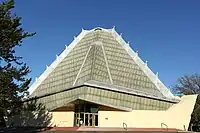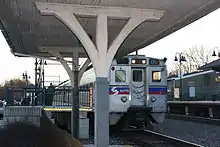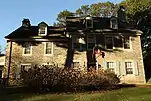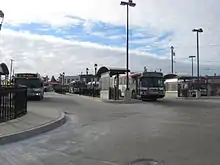Warminster Line
The Warminster Line is a route of the SEPTA Regional Rail commuter rail system. It serves stations between its namesake town, Warminster, and Center City, Philadelphia. Half of the route is shared by other lines, including the Lansdale/Doylestown Line, West Trenton Line, Fox Chase Line, Chestnut Hill East Line, and Manayunk/Norristown Line. The great majority of trains continue as part of the Airport Line.
| Warminster Line | |||||||||||||||||||||||||||||||||||||||||||||||||||||||||||||||||||||||||||||||||||||||||||||||||||||||||||||||||||||||||||||||||||||||||||||||||||||||||||||||||||||||||||||||||||||||||||||||||||||||||||||||||||||||||||||||||||||||||||||||||||||||||||||||||||||||||||||||||||||||||||||||||
|---|---|---|---|---|---|---|---|---|---|---|---|---|---|---|---|---|---|---|---|---|---|---|---|---|---|---|---|---|---|---|---|---|---|---|---|---|---|---|---|---|---|---|---|---|---|---|---|---|---|---|---|---|---|---|---|---|---|---|---|---|---|---|---|---|---|---|---|---|---|---|---|---|---|---|---|---|---|---|---|---|---|---|---|---|---|---|---|---|---|---|---|---|---|---|---|---|---|---|---|---|---|---|---|---|---|---|---|---|---|---|---|---|---|---|---|---|---|---|---|---|---|---|---|---|---|---|---|---|---|---|---|---|---|---|---|---|---|---|---|---|---|---|---|---|---|---|---|---|---|---|---|---|---|---|---|---|---|---|---|---|---|---|---|---|---|---|---|---|---|---|---|---|---|---|---|---|---|---|---|---|---|---|---|---|---|---|---|---|---|---|---|---|---|---|---|---|---|---|---|---|---|---|---|---|---|---|---|---|---|---|---|---|---|---|---|---|---|---|---|---|---|---|---|---|---|---|---|---|---|---|---|---|---|---|---|---|---|---|---|---|---|---|---|---|---|---|---|---|---|---|---|---|---|---|---|---|---|---|---|---|---|---|---|---|---|---|---|---|---|---|---|---|---|---|---|---|---|---|---|---|---|---|---|---|---|---|---|---|---|
 Southbound Warminster Line train between Hatboro and Willow Grove stations | |||||||||||||||||||||||||||||||||||||||||||||||||||||||||||||||||||||||||||||||||||||||||||||||||||||||||||||||||||||||||||||||||||||||||||||||||||||||||||||||||||||||||||||||||||||||||||||||||||||||||||||||||||||||||||||||||||||||||||||||||||||||||||||||||||||||||||||||||||||||||||||||||
| Overview | |||||||||||||||||||||||||||||||||||||||||||||||||||||||||||||||||||||||||||||||||||||||||||||||||||||||||||||||||||||||||||||||||||||||||||||||||||||||||||||||||||||||||||||||||||||||||||||||||||||||||||||||||||||||||||||||||||||||||||||||||||||||||||||||||||||||||||||||||||||||||||||||||
| Status | Operating | ||||||||||||||||||||||||||||||||||||||||||||||||||||||||||||||||||||||||||||||||||||||||||||||||||||||||||||||||||||||||||||||||||||||||||||||||||||||||||||||||||||||||||||||||||||||||||||||||||||||||||||||||||||||||||||||||||||||||||||||||||||||||||||||||||||||||||||||||||||||||||||||||
| Termini | Penn Medicine Warminster | ||||||||||||||||||||||||||||||||||||||||||||||||||||||||||||||||||||||||||||||||||||||||||||||||||||||||||||||||||||||||||||||||||||||||||||||||||||||||||||||||||||||||||||||||||||||||||||||||||||||||||||||||||||||||||||||||||||||||||||||||||||||||||||||||||||||||||||||||||||||||||||||||
| Stations | 17 | ||||||||||||||||||||||||||||||||||||||||||||||||||||||||||||||||||||||||||||||||||||||||||||||||||||||||||||||||||||||||||||||||||||||||||||||||||||||||||||||||||||||||||||||||||||||||||||||||||||||||||||||||||||||||||||||||||||||||||||||||||||||||||||||||||||||||||||||||||||||||||||||||
| Website | septa.org | ||||||||||||||||||||||||||||||||||||||||||||||||||||||||||||||||||||||||||||||||||||||||||||||||||||||||||||||||||||||||||||||||||||||||||||||||||||||||||||||||||||||||||||||||||||||||||||||||||||||||||||||||||||||||||||||||||||||||||||||||||||||||||||||||||||||||||||||||||||||||||||||||
| Service | |||||||||||||||||||||||||||||||||||||||||||||||||||||||||||||||||||||||||||||||||||||||||||||||||||||||||||||||||||||||||||||||||||||||||||||||||||||||||||||||||||||||||||||||||||||||||||||||||||||||||||||||||||||||||||||||||||||||||||||||||||||||||||||||||||||||||||||||||||||||||||||||||
| Type | Commuter rail | ||||||||||||||||||||||||||||||||||||||||||||||||||||||||||||||||||||||||||||||||||||||||||||||||||||||||||||||||||||||||||||||||||||||||||||||||||||||||||||||||||||||||||||||||||||||||||||||||||||||||||||||||||||||||||||||||||||||||||||||||||||||||||||||||||||||||||||||||||||||||||||||||
| System | SEPTA Regional Rail | ||||||||||||||||||||||||||||||||||||||||||||||||||||||||||||||||||||||||||||||||||||||||||||||||||||||||||||||||||||||||||||||||||||||||||||||||||||||||||||||||||||||||||||||||||||||||||||||||||||||||||||||||||||||||||||||||||||||||||||||||||||||||||||||||||||||||||||||||||||||||||||||||
| Operator(s) | SEPTA Regional Rail | ||||||||||||||||||||||||||||||||||||||||||||||||||||||||||||||||||||||||||||||||||||||||||||||||||||||||||||||||||||||||||||||||||||||||||||||||||||||||||||||||||||||||||||||||||||||||||||||||||||||||||||||||||||||||||||||||||||||||||||||||||||||||||||||||||||||||||||||||||||||||||||||||
| Rolling stock | Electric Multiple Units | ||||||||||||||||||||||||||||||||||||||||||||||||||||||||||||||||||||||||||||||||||||||||||||||||||||||||||||||||||||||||||||||||||||||||||||||||||||||||||||||||||||||||||||||||||||||||||||||||||||||||||||||||||||||||||||||||||||||||||||||||||||||||||||||||||||||||||||||||||||||||||||||||
| Daily ridership | 9,426[1] | ||||||||||||||||||||||||||||||||||||||||||||||||||||||||||||||||||||||||||||||||||||||||||||||||||||||||||||||||||||||||||||||||||||||||||||||||||||||||||||||||||||||||||||||||||||||||||||||||||||||||||||||||||||||||||||||||||||||||||||||||||||||||||||||||||||||||||||||||||||||||||||||||
| Technical | |||||||||||||||||||||||||||||||||||||||||||||||||||||||||||||||||||||||||||||||||||||||||||||||||||||||||||||||||||||||||||||||||||||||||||||||||||||||||||||||||||||||||||||||||||||||||||||||||||||||||||||||||||||||||||||||||||||||||||||||||||||||||||||||||||||||||||||||||||||||||||||||||
| Track gauge | 4 ft 8 1⁄2 in (1,435 mm) standard gauge | ||||||||||||||||||||||||||||||||||||||||||||||||||||||||||||||||||||||||||||||||||||||||||||||||||||||||||||||||||||||||||||||||||||||||||||||||||||||||||||||||||||||||||||||||||||||||||||||||||||||||||||||||||||||||||||||||||||||||||||||||||||||||||||||||||||||||||||||||||||||||||||||||
| Electrification | Catenary | ||||||||||||||||||||||||||||||||||||||||||||||||||||||||||||||||||||||||||||||||||||||||||||||||||||||||||||||||||||||||||||||||||||||||||||||||||||||||||||||||||||||||||||||||||||||||||||||||||||||||||||||||||||||||||||||||||||||||||||||||||||||||||||||||||||||||||||||||||||||||||||||||
| |||||||||||||||||||||||||||||||||||||||||||||||||||||||||||||||||||||||||||||||||||||||||||||||||||||||||||||||||||||||||||||||||||||||||||||||||||||||||||||||||||||||||||||||||||||||||||||||||||||||||||||||||||||||||||||||||||||||||||||||||||||||||||||||||||||||||||||||||||||||||||||||||
Route
The Warminster Line uses the SEPTA Main Line between Center City and Glenside, where it branches off onto its own line to Hatboro and Warminster. The tracks continue past Warminster to Ivyland and eventually to New Hope, where the New Hope Railroad runs heritage excursion trains.
The Warminster Line becomes a single-track line just north of Ardsley, but was once double-tracked as far north as Roslyn, the original northbound track being removed in 2010. A passing siding exists north of Willow Grove. There is also a second storage track at the Hatboro station and the line becomes double-tracked again as it approaches the terminus at Warminster station.
History
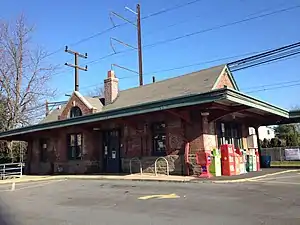
The North Pennsylvania Railroad formed the North East Pennsylvania Railroad in 1870 to construct a branch from its line at Abington (as Glenside was then known) to Hatboro. The line opened on December 18, 1872.[2] The line was further extended to Hartsville on November 9, 1874.[3] The Philadelphia & Reading Railroad, forerunner of the Reading Company (RDG), leased the parent North Pennsylvania Railroad in 1879, gaining control of the line. It extended the line to its final terminus at New Hope on April 29, 1891.[4] The Reading electrified the line, which it called the New Hope Branch, as far as Hatboro on July 26, 1931.[5]
In 1952, all passenger service ceased north of Hatboro to New Hope, with every station except Rushland, Wycombe, Lahaska and New Hope being demolished in 1954. Between 1952 and 1966, only freight trains traveled north of Hatboro to serve customers in Warminster, Ivyland, Rushland, Buckingham and New Hope. In 1966, the New Hope & Ivyland Railroad (NHIR) was launched and purchased 16 miles of track from Ivyland to New Hope. After 1966, Ivyland served as a freight interchange between RDG and NHIR and the RDG relabeled their remaining ownership of the line as the Warminster Branch. Not only did they transport freight, but also run scenic heritage excursions, originally from New Hope to Buckingham, but has been cutback to Lahaska in the 1980s. However, passenger service between Warminster and Hatboro was still inactive.
In 1971, RDG filed for bankruptcy after a variety of misfortunes; among them are increased use of trucks and a dwindling economy. The court issued a bankruptcy protection so RDG can still operate. On July 29, 1974, passenger service was extended to Warminster after RDG completed an extension of the electrification from Hatboro (the original electrified terminus) to Warminster.[6] Willow Grove and Warminster stations were also rebuilt in the same year. By that time, executives of RDG didn't see their debt becoming any better. Less than two years later, RDG's rolling stock, right-of-ways, interests and stock were in the hands of Conrail, also known as the Consolidated Rail Corporation, which launched operations on April 1, 1976. In 1983, SEPTA took control of the Warminster Branch. A train crash occurred on July 1, 2006 in Abington Township injuring 38 and 6 crew members.[7]
Beginning in 1984 the route was designated R2 Warminster as part of SEPTA's diametrical reorganization of its lines. Warminster Line trains operated through the city center to the Wilmington/Newark Line (then Marcus Hook) on the ex-Pennsylvania side of the system.[8] The R-number naming system was dropped on July 25, 2010.[9] As of 2018 the majority of Warminster trains continue on to the Airport Line, though some peak hour weekday trains terminate at 30th Street Station.[10]
On April 18, 2016, SEPTA launched positive train control on the Warminster Line, the first Regional Rail line to use the signal system which will enhance safety.[11][12]
Potential for expansion beyond Warminster
In a 1991 report, the Delaware Valley Regional Planning Commission ranked the line between Warminster and New Hope as having "medium potential" for reuse based on projected growth in population and employment in the region. It noted that SEPTA considered the line a "long range transit opportunity corridor."[13]
Stations
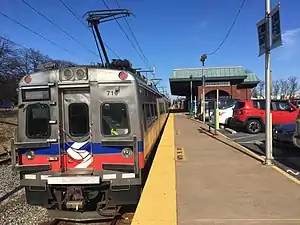
The Warminster Line includes the following stations north of the Center City Commuter Connection; stations indicated with gray background area closed.
| Zone[14] | Location | Station | Miles (km) from Center City |
Date opened | Connections / notes |
|---|---|---|---|---|---|
| C | Temple University | Temple University |
2.1 (3.4) | SEPTA Regional Rail: All lines | |
| 1 | Nicetown–Tioga, Philadelphia | Wayne Junction |
5.1 (8.2) | SEPTA Regional Rail: Chestnut Hill East, Fox Chase, Lansdale/Doylestown, West Trenton lines SEPTA City Bus: 2, 23, 53, 75 | |
| Olney-Oak Lane, Philadelphia | |||||
| Logan | One of four stations discontinued on October 4, 1992[15] | ||||
| Tabor | Closed 1992 | ||||
| Fern Rock Transportation Center |
7.3 (11.7) | SEPTA Regional Rail: Lansdale/Doylestown, West Trenton lines SEPTA City Transit: Broad Street Line SEPTA City Bus: 4, 28, 57, 70 | |||
| 2 | Melrose Park | Melrose Park |
8.4 (13.5) | SEPTA Regional Rail: Lansdale/Doylestown, West Trenton lines | |
| Elkins Park | Elkins Park | 9.2 (14.8) | May 14, 1899[16] | SEPTA Regional Rail: Lansdale/Doylestown, West Trenton lines SEPTA City Bus: 28 | |
| 3 | Jenkintown | Jenkintown–Wyncote | 10.8 (17.4) | SEPTA Regional Rail: Lansdale/Doylestown, West Trenton lines SEPTA City Bus: 77 | |
| Glenside | Glenside | 11.9 (19.2) | SEPTA Regional Rail: Lansdale/Doylestown Line SEPTA City Bus: 22, 77 | ||
| Ardsley |
13.0 (20.9) | ||||
| Roslyn | Roslyn |
14.2 (22.9) | SEPTA City Bus: 22 | ||
| Abington | Crestmont |
15.4 (24.8) | |||
| Willow Grove | Willow Grove | 16.2 (26.1) | SEPTA City Bus: 22, 55, 310, 311 | ||
| Upper Moreland Township | Fulmor | 18.1 (29.1) | Closed November 10, 1996[17] | ||
| Hatboro | Hatboro | 18.6 (29.9) | |||
| Warminster | Warminster |
20.1 (32.3) | July 29, 1974[18] | SEPTA City Bus: 22 TMA Bucks: Richboro-Warminster Rushbus[19] |
Ridership
Between FY 2008–FY 2018 yearly ridership on the Warminster Line has ranged between 2.4–2.7 million.[note 1]
Notes
References
- "Fiscal Year 2020 Annual Service Plan" (PDF). SEPTA. June 2019. p. 42. Retrieved December 14, 2019.
- "North Pennsylvania Railroad". American Railroad Journal. XXX (22): 675. May 30, 1874.
- "North Pennsylvania Railroad". American Railroad Journal. XXXI (28): 6. June 5, 1875.
- "North East Pennsylvania Railroad". Poor's Manual of Railroads: 1049. 1917.
- Williams, Gerry (1998). Trains, Trolleys & Transit: A Guide to Philadelphia Area Rail Transit. Piscataway, New Jersey: Railpace Company. p. 46. ISBN 978-0-9621541-7-1.
- SEPTA Extends Commuter Line Railway Age August 12, 1974 page 54
- King, Larry (August 5, 2007). "A collision of errors on the R2 is detailed". The Philadelphia Inquirer. Retrieved September 15, 2020.
- Vuchic, Vukan; Kikuchi, Shinya (1984). General Operations Plan for the SEPTA Regional High Speed System. Philadelphia: SEPTA. pp. 2–8.
- Lustig, David (November 2010). "SEPTA makeover". Trains. Kalmbach Publishing: 26.
- "Warminster Line schedule" (PDF). SEPTA. December 16, 2018. Retrieved December 24, 2018.
- Laughlin, Jason (February 28, 2016). "Feds approve new SEPTA train-control safety system". The Philadelphia Inquirer. Retrieved May 22, 2016.
- "Positive Train Control Update". SEPTA. April 28, 2016. Retrieved May 22, 2016.
- "Potential Reuse of Inactive Rail Lines" (PDF). Delaware Valley Regional Planning Commission. Retrieved 2 February 2021.
- "Warminster Line Timetable" (PDF). Philadelphia, Pennsylvania: Southeastern Pennsylvania Transportation Authority. September 10, 2017. Retrieved October 19, 2017.
- "New Rail Schedules Set". The Philadelphia Inquirer. Philadelphia, Pennsylvania. October 2, 1992. p. 36. Retrieved October 19, 2017 – via Newspapers.com.

- "Elkins Station Opened at Ogontz Park". The Philadelphia Times. May 15, 1899. p. 3. Retrieved July 3, 2019 – via Newspapers.com.

- Dougherty, Frank (October 25, 1996). "Septa Board Cuts Service But Opposition Is Spirited". The Philadelphia Inquirer. Retrieved October 19, 2016.
- "The Scene". The Philadelphia Inquirer. July 29, 1974. p. 1. Retrieved July 2, 2019 – via Newspapers.com.

- "Richboro-Warminster Rushbus" (PDF). tmabucks.com. TMA Bucks. p. January 2, 2015. Retrieved October 19, 2017.
- "Fiscal Year 2019 Annual Service Plan" (PDF). SEPTA. June 2018. p. 74. Retrieved December 14, 2019.
- "Fiscal Year 2018 Annual Service Plan" (PDF). SEPTA. June 2017. p. 44. Retrieved December 14, 2019.
- "Fiscal Year 2017 Annual Service Plan" (PDF). SEPTA. October 2016. p. 70. Retrieved December 14, 2019.
- "Fiscal Year 2016 Annual Service Plan" (PDF). SEPTA. June 2015. p. 94. Retrieved December 14, 2019.
- "Fiscal Year 2015 Annual Service Plan" (PDF). SEPTA. May 2014. p. 60. Retrieved December 14, 2019.
- "Fiscal Year 2014 Annual Service Plan" (PDF). SEPTA. May 2013. p. 44. Retrieved December 14, 2019.
- "Fiscal Year 2013 Annual Service Plan" (PDF). SEPTA. May 2012. p. 55. Retrieved December 14, 2019.
- "Fiscal Year 2012 Annual Service Plan" (PDF). SEPTA. July 2011. p. 94. Retrieved December 14, 2019.
- "Fiscal Year 2011 Annual Service Plan" (PDF). SEPTA. June 2010. p. 70. Retrieved December 14, 2019.
- "Fiscal Year 2010 Annual Service Plan" (PDF). SEPTA. June 2009. p. 63. Retrieved December 14, 2019.
External links
| Wikimedia Commons has media related to Warminster Line. |
